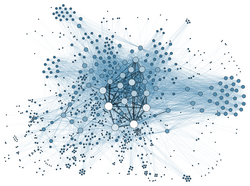| Part of a series on |
| Sociology |
|---|
 |
The following outline is provided as an overview of and topical guide to the discipline of sociology:
Sociology is the systematic study of society, human social behavior, and patterns of social relationships, social interaction, and culture. The term sociology was coined in the late 18th century to describe the scientific study of society. [1] It uses a range of methods — from qualitative interviews to quantitative data analysis — to examine how social structures, institutions, and processes shape individual and group life. Sociology encompasses various subfields such as criminology, medical sociology, education, and increasingly, digital sociology, which studies the impact of digital technologies on society. Digital sociology examines the impact of digital technologies on social behavior and institutions, encompassing professional, analytical, critical, and public dimensions. [2] The internet has reshaped social networks and power relations, illustrating the growing importance of digital sociology. [3] Sociologists seek to understand how identities, inequalities, norms, and institutions evolve across time and context.
